Interview: Asghar Farhadi on Globe Nominee "The Past"
 Thursday, December 19, 2013 at 6:44PM
Thursday, December 19, 2013 at 6:44PM 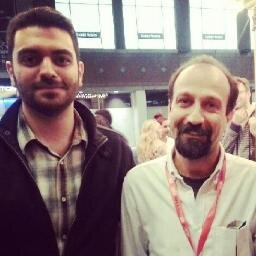 Amir and Asghar Farhadi @ TIFFAmir here, to share with you my fantastic experience of interviewing the director of The Past, A Separation and About Elly. About a decade ago, when Asghar Farhadi made his first feature film after years of successful theatre and TV work, even the most optimistic fan of Iranian cinema could not imagine his stratospheric rise to International Auteur status in such a short span of time. It is heart-warming for an industry that has only gained international prominence in the past two decades to see one of its sons holding an Oscar statue. Farhadi’s popularity comes at a critical point for Iranian cinema, when festival presence is not as regular as it was in the nineties and several major filmmakers have had their careers stalled for political reasons.*
Amir and Asghar Farhadi @ TIFFAmir here, to share with you my fantastic experience of interviewing the director of The Past, A Separation and About Elly. About a decade ago, when Asghar Farhadi made his first feature film after years of successful theatre and TV work, even the most optimistic fan of Iranian cinema could not imagine his stratospheric rise to International Auteur status in such a short span of time. It is heart-warming for an industry that has only gained international prominence in the past two decades to see one of its sons holding an Oscar statue. Farhadi’s popularity comes at a critical point for Iranian cinema, when festival presence is not as regular as it was in the nineties and several major filmmakers have had their careers stalled for political reasons.*
Farhadi's follow up to the Academy Award-winning classic A Separation, The Past will be representing Iran in the Best Foreign Film Oscar competition and was just nominated for the Golden Globe for Best Foreign Film. Farhadi's latest is a Paris-set melodrama starring two recognizable stars in The Artist's Berenice Bejo (Cannes Winner Best Actress) and Tahar Rahim as well as Iranian superstar Ali Mosaffa.** In the film, Bejo plays Marie, a French woman married to Ahmad (Mosaffa) who is in custody of their children after a breakup. When Ahmad receives a letter from his wife to return to Paris to finalize the divorce, he is confronted with Samir (Rahim), Marie’s new boyfriend, himself married with a son to a woman in a coma. And that’s just the beginning of the complications in this romantic triangle.
Thematically and structurally, The Past isn’t an uncharted territory for a director who’s been building such intricate mazes since Fireworks Wednesday. The biggest difference is that Farhadi is working away from home for the first time, in a language that’s all new to him. This cultural and geographical distance seemed like a good place to start our interview, which I had the pleasure of conducting during the Toronto International Film Festival. When I brought up these differences, Farhadi insisted it was the similarities he’s more interested in.
“For human beings, comparison is a method of recognition and comparison is rooted in difference, so that’s what we naturally like to highlight. Lifestyles may vary around the world but emotional responses are all the same. I can’t imagine that someone falling in love in Japan feels differently than someone falling in love in the US. My stories are founded on these similarities.”
Despite that, Farhadi was very specific about choosing France as the backdrop of his story. The Past hinges on the history of the central relationship and Farhadi smartly uses the city’s sense of history to reflect that.
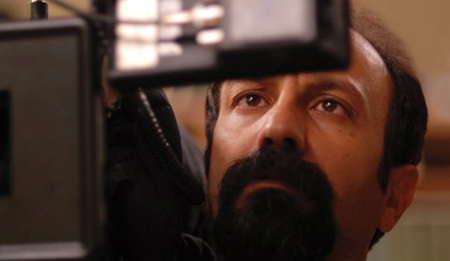
“The story told me to make the film in France. If it was set in two different cities in Iran, the distance wouldn’t be felt as much. And I chose Paris of all cities because the film is about revisiting a history. I had to set it in a city that smelled of the past. If I’d made this in Hong Kong or here in Toronto, you’d never feel what I meant to say. Paris, like Rome, is a city where history is a living thing.”
Of course, the decision to make the film in France was a major shift for a director whose films are so deeply rooted in the fabric of Iranian culture. Farhadi didn’t seem to be bother by the culture shock, though.
“I can only speak about my personal experience, not about industries as a whole. I didn’t make films like other directors in Iran and I didn’t do it like others in France either. Here, I had much more money and resources at my service but I’m totally the same filmmaker. I’ve brought up this example many times. If you walk through an unpaved road for many years, you’ll still stumble if you walk on a perfect, paved road. You get used to it.”
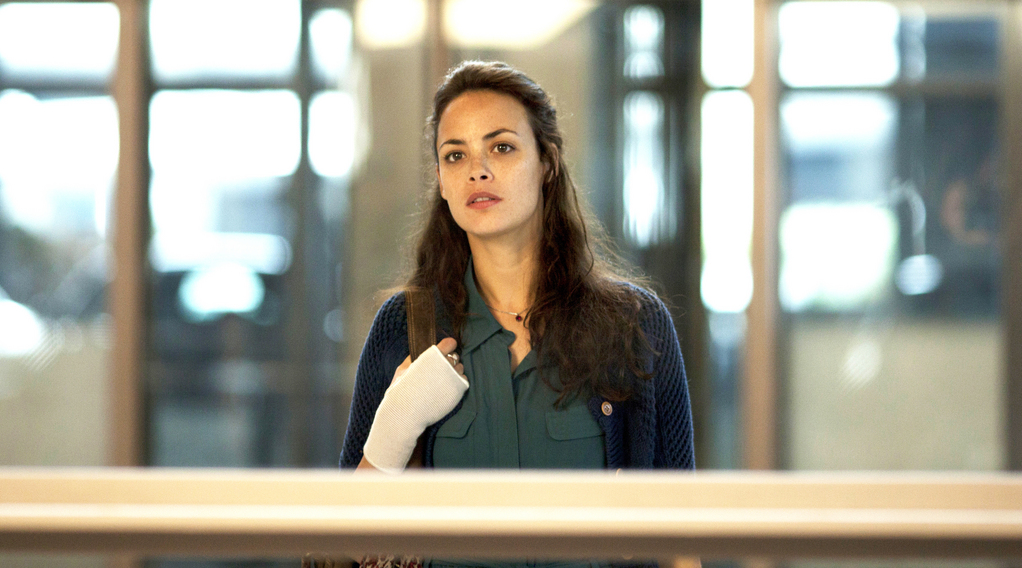
Farhadi is referring to the commonplace practice of censorship that limits the freedom of expression of Iranian filmmakers, though he’s always been able to work his way around those obstacles with subtle, subversive storytelling. But The Past, although made in a different setting, is still very much an Iranian film, not just because it’s developed by a director from that country, but also because the relationship dynamics, its exploration of the male psyche and its concerns regarding living away from home are formed through an Iranian prism. When I brought this up to Farhadi and compared his film to Certified Copy – another entirely Iranian film in my opinion – he had different ideas. “I think that the identity of any film is shaped by its audience. French audiences will view this film as French. Iranians as Iranian. That’s what I’ve been told by audiences in either country. It makes me happy, because I know everyone can make these universal connections. But I think that, like all people, my personality was shaped by the environment I was raised in. All filmmakers are nurtured by their environment.”
Asked what he thinks contributes to his universally relatable themes, Farhadi mentioned that writing for him is a way of working out how he feels about relationships between people and argued that their real life inspirations are why the audience can connect to them. “I take my stories from the memories of my friends or myself. When I start writing I don’t begin to think about what subject I want to tackle. I close my eyes and let the story come my way. I believe that all themes exist within all stories in the world. How one tells them highlights specific themes. Even bedtime stories have themes of love, fear and hatred; but when we tell them to our children we highlight the beautiful things. The fact that I spend a lot of time thinking about how people deal with their past and their separations is something subconscious but it is rooted in the real world, not in my head.”
One of the aspects of The Past that is really intriguing is the performances by the young actors in the film, particularly Elyes Aguis, who is probably the strongest member of the whole cast. Farhadi has a history of getting superb performances from children – notably his own daughter in A Separation – so I asked him what he highlights when he tells his own stories to young cast members.
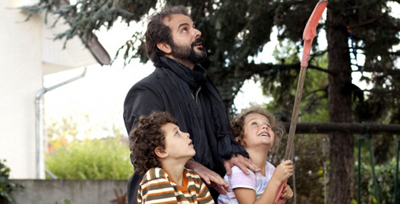 The Past, like A Separation, features astonishingly natural performances from child actors
The Past, like A Separation, features astonishingly natural performances from child actors
“With adult actors you have to be honest, but not with children. Unfortunately you have to play with their minds. When Fouad (Aguis) was in rehearsals, I tried to avoid making a connection between him and his real mother in the film (Rahim’s on screen wife). I made an unpleasant image of that woman for him to make him like Marie (his stepmother) more. I asked Berenice (Bejo) to take the two children with her and Ali (Mosaffa) to Disneyland one day like a real family. A similar thing happened with the little boy in Fireworks Wednesday. His mother believes that her husband is cheating on her. If I’d told the truth to the child, he’d have hated his father but that’s not what the story needed. I’d told him that when his father leaves the house, his mother is on the phone with another man, and he started to dislike the actress that played his mother. And you can sense that in the film. When this kid saw the film, he called me after the first screening and sounded so surprised.”
Farhadi’s films always feel so tightly wrought, one gets the sense that he might have as much control over his adult cast members as the younger ones, but Farhadi disagrees. “You’ve probably heard that from my actors! I don’t actually feel like a dictator at all. I try to make them feel like they’re free. In rehearsals I always ask them to improvise. I only turn into a dictator once shooting starts! There’s no other choice. Film is like a puzzle. If someone changes something at will at any point, a few scenes down the chain the whole film will be thrown off.”
The notion that Farhadi looks at his films as puzzles isn’t entirely surprising, given the labyrinthine structure of his scripts. He argued that his films are like detective stories since their central mystery is left to us to decode, but structurally different because we don’t follow one person (the detective); the story is explored from all perspectives involved. “The more perspectives you show, the more complex your story becomes. But it’s also very important to me to give everyone a fair treatment. I have faith in this idea. In all my works, I’ve tried to maintain this type of characterization. I don’t want to say that everything everybody does is right but I repeat this cliché that all people have reasons for what they do, sometimes even without their own knowledge. In The Past, Marie wants Ahmad to come home instead of a hotel and doesn’t know why she wants that. She’s unaware of what she’s asking. It comes from her subconscious. When it’s all said and done, she just realizes what her decision means.”
Moving away from Farhadi’s most recent work, I was curious to know what his influences were in his earlier years. “In my teenage years, we used to watch two types of films often. Since Iran was at war with Iraq, TV would always show European war films. In retrospect, I can see how harmful those films were for a teenager. The reason I never show violence in my films is a reaction to the films I watched then. At that time, we felt the need to resort to something completely magical and fun, which is why I often watched Bollywood films. I’m very familiar with Indian cinema like a lot of Iranians, but they’ve had little influence on my filmmaking.”
This is certainly not surprising for foreign audiences who came around to Farhadi’s work with About Elly or A Separation, but he has worked on lighter fare and actually penned one of the funniest screenplays in Iranian cinema for a film called Tambourine, which his wife directed. When I asked him if he felt any pressure to continue doing serious work now that his films receive widespread international attention, he said it was quite the opposite. “I would love to write a comedy film again! I really have two wishes at this point: to go back to working in theatre, and to write another comedy for my wife to direct.”
The Past opens in the United States in limited release tomorrow.
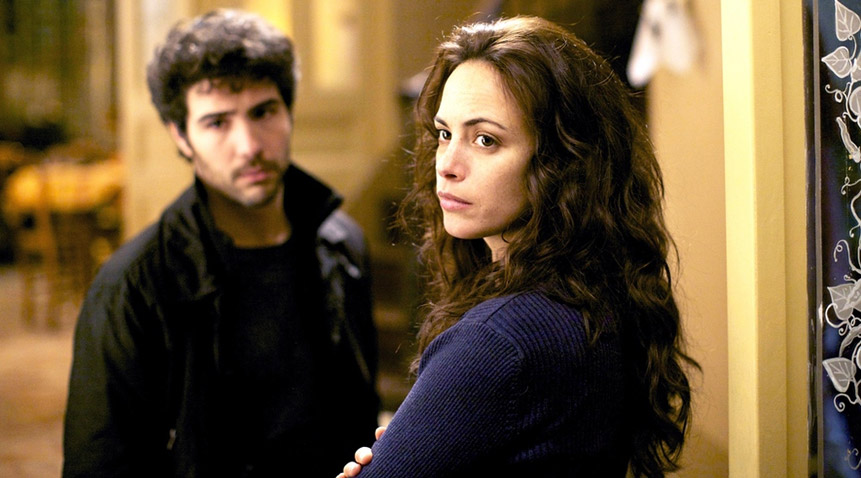
*If you’re interested in my thoughts on the status quo of Iranian cinema, I’ve detailed it all out in this piece.
**Trivia: Mosaffa is the real life husband of A Separation’s Leila Hatami!



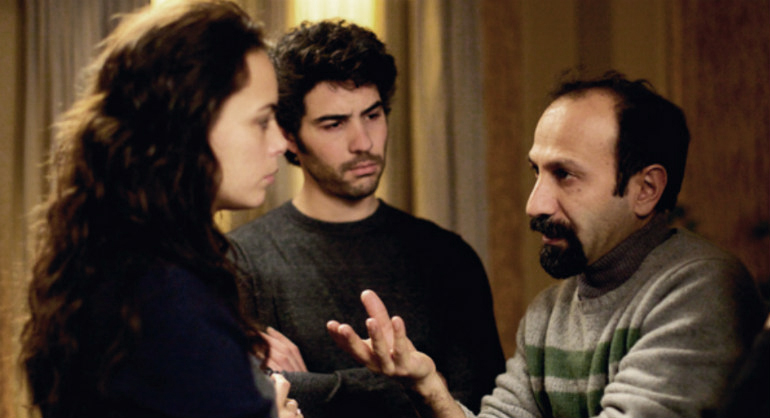
Reader Comments (4)
This was a great interview, Amir, and it's fabulous to have one more Iranian celeb-auteur in the world. Especially since I find his films offer a peek into parts of Iranian society we don't get to see much on Western cinema screens.
I know people consider it a lesser than A Separation but dammit, melodramas are my crack and this was Grade-A on that. Farhadi seems to get more out of his child performers than anybody I've seen in recent memory. Maybe because what he considers what children observe. It feels believable as opposed to the polarity we get in either precocious or dumb.
I love Iranian cinema and Farhadi's work has been one of the best recent discoveries film-wise (I have seen Fireworks Wednesday, About Elly and A Separation, the last two absolute masterpieces). I watched The Past today and did not feel it comes even close to those movies mentioned neither in construction nor performance-wise. The cultural aspects that dictate the character's behaviors in his Iranian-set movies is a big miss here. I didn't feel the urgency of the situation even though I was being told by the plot twists to do so. Those twists didn't feel organic like in his previous movies. In those movies, Farhadi's scripts are like amazing trials being reenacted to us and we get to see what happens partially and then entirely, but The Past's biggest plot point is never shown, only talked about, and is not a very thrilling one. The performances were good, but not on the same level of the other movies. I guess the characters were not as complex.
p.s. Ahmad is not the father of the girls as you stated. He is Marie's second husband.
I would like to see The Past getting more promotion. Like A Separation, The Past is a powerful, provocative film by a true auteur--one of the best.